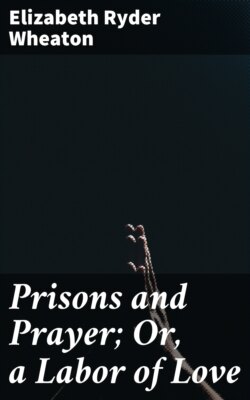Читать книгу Prisons and Prayer; Or, a Labor of Love - Elizabeth Ryder Wheaton - Страница 50
На сайте Литреса книга снята с продажи.
SUICIDE OF A PRISONER.
ОглавлениеWhile on my way to the State Prison at Chester, Illinois, in the year 1888 (if I remember rightly) I was especially impressed by the sad appearance of a fellow-passenger, a mother, accompanied by three children. I was sure that she was in deep trouble. I said to my helper, "Mary, that woman is going to the Penitentiary." She said, "How do you know?" I answered. "I feel sure of it and I will convince you that I am right."
Having entered into conversation with the woman, I assisted her as I found opportunity in caring for her children. When I asked her where she was going, she said, "I am going to Chester." I said, "I, too, am going to Chester and will gladly assist you in getting off with the children."
At the station we parted, but the next morning, which was the Sabbath, as I passed through the guard-room of the State Prison I saw this woman talking to her husband, who was a prisoner. She sat beside him and he was holding one of the children and she had another in her arms. The third was playing near by. All were too young to know of the sorrow that had come to their home, or the shame that had fallen upon them. They were with papa and mamma and felt safe and happy. Alas! how little they knew how soon they were to be left fatherless!
I passed on and was busy during the entire day for I had the liberty of the prison and the privilege of working among the prisoners. So busy was I that for the time being I had lost sight of that poor wife and mother, but only the next morning the Chaplain called for me and said, "Sister Wheaton, I have oh, such a sad task before me this morning! I wish you would do it for me." I said, "Chaplain, I will try. I am willing to do anything that I can to help you." And then he said, "Do you remember the man and woman you saw yesterday in the guard-room talking?" I said, "Yes; I remember them well; I met the woman on the train on my way here." He replied, "Well, that man was so heart-broken at the thought of parting with his wife and children that he asked her to promise him that if he should die in the prison she would have him brought home for burial. She promised him she would do so and last night that poor man committed suicide in his cell and now someone must go and tell that woman of her husband's death." I said, "Chaplain, that is a hard thing to do, but I will try." He said, "I wish you would—being a woman you can comfort her better than I could." Well, I went along the hall until I came to the door of the room she occupied, for, she too, as well as myself, was a guest of the kind warden's wife. I opened the door softly and looked in. In memory I can see her yet as she sat with one child in her lap while the other two little ones were playing around her knee. She was softly singing some old country tune. As I looked my heart failed me. I turned away in sorrow and returned to the Chaplain and said, "Chaplain, I cannot do it. I cannot break that poor woman's heart. I just can't tell her," and he said, "Then I will have to do it. Someone must tell her," and so he broke the message as best he could. Never will I forget the anguish of that poor woman's heart as she wept out her grief and suffering! I tried to comfort her as best I could. I took the same train with her as she started for home with her husband's body in the baggage coach ahead. As best I could I ministered to her and those poor helpless children as long as our journey carried us over the same road and when I changed cars I tried to utter some words of comfort, but oh, friends, what could I say, what could I do? Only the sympathy of the loving Savior could reach her case and I left her, never to meet her again on this side, but oh, may we not hope that in some way God found a way to have mercy upon that poor, misjudged man and that those loved ones may meet again where no mistakes will be made by judge or jury? For many believed that poor man to be innocent of the crime with which he was charged. If I remember rightly a barn had been burned and he had been accused of setting it on fire and had been convicted through purely circumstantial evidence. Brokenhearted over his disgrace and the thought of again being separated from wife and children, the poor man made a rope of the bed-clothing in his cell and used it to take his own life.
